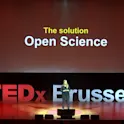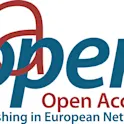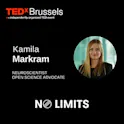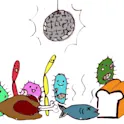
Young Minds
05 May 2017
Frontiers for Young Minds and GLOBE: An exciting new partnership
Frontiers for Young Minds is excited to announce its new partnership with The GLOBE Program!

Young Minds
05 May 2017
Frontiers for Young Minds is excited to announce its new partnership with The GLOBE Program!

Open science policy
19 Apr 2017
Open Access publisher Frontiers’ CEO, Kamila Markram, makes a case for why open science is the key to innovation, economic growth and solutions to a sustainable future.
Young Minds
11 Apr 2017
Frontiers for Young Minds is expanding and we are pleased to announce the launch of its newest specialty section, Understanding Mathematics.

Open science and peer review
24 Mar 2017
Frontiers invited by the OAPEN Foundation to be included in a list of book publishers that comply with the Open Access requirements of ERC, Wellcome and FWF.

Young Minds
08 Mar 2017
Understanding the Earth and its Resources aims to provide up-to-date research to the next generation who will live with, and study, these planet-wide questions.

Open science and peer review
06 Mar 2017
Academic output has exploded over the last 100 years but how can the most relevant research be found? — by Melissa Cochrane In 2009, it’s estimated there were at least 50 million research publications floating around the coves of the internet. If you printed all of them out and put them side by side, you could go all the way around the earth. Based on the recent data, however, it appears the number of publications are at least 3 times larger than previously thought, at around 160 million, and the growth rate has increased to 0.8% per month, doubling in just over 7 years. It’s clear that the scientific world is booming with information, but how do researchers find out who, what and where is relevant to their specific fields? How on earth can we navigate all this? Kicked off two years ago, Microsoft Academic is a research project inside Microsoft Research. At its core is an artificial intelligence agent that reads all academic publications on the web to learn and automatically create a massive knowledge base, going far beyond a simple keyword-matching search to provide an overall benchmark and the context of what you’re looking for. A goal of […]

Open science and peer review
03 Mar 2017
Open Science: Removing the limits on science to drive innovation and advance knowledge.

Young Minds
13 Jan 2017
Frontiers in Microbiology specialty sections are turned into fun illustrations. Enjoy, download and color them! — by Chloe Schmidt Frontiers in Microbiology Art Gallery Frontiers in Microbiology is the largest and second most-cited open-access journal in the category of Microbiology, based on our analysis of the 2015 Journal Citation Report (Thomson Reuters, 2016). Along with our other journal in the field, Frontiers in Cellular and Infection Microbiology, Frontiers in Microbiology is comprised of 16 specialty sections that seek to cover all areas of microbiology. We depicted the microbiology specialty sections in the artistic interpretations in the gallery below — and make these available for download as a coloring book, please see below. The building blocks of our sections are article collections called Research Topics. Research Topics delve into more specialized subjects and are proposed, organized and hosted by Guest Associate Editors. If there is a particular area of research that you feel warrants deeper exploration, don’t hesitate to get in touch with us about creating a proposal at: microbiology@frontiersin.org Coloring Book download and instructions: Print one for your kids, your stressed colleagues, or yourself. We want to see your creations! Tweet them at @FrontMicrobiol using the hashtag #ColorMeMicrobe P.S. Check out our journal […]

Open science policy
11 Jan 2017
To innovate effectively, the results of research must be open to all of society. Today, there is exponential growth in the knowledge produced by scientific, medical and technical research, and new tools are being developed that can exploit these data in powerful ways. One of the most promising of these tools is text and data mining (TDM), i.e., the automated computational analysis of digital content. The European Commission recognises the potential of TDM and is currently considering updating and clarifying the legal provisions for its use. Frontiers, as well as the other signatories of the attached position statement, urge European legislators to support a copyright exception that clearly includes all research bodies (i.e. businesses and SMEs, as well as universities, institutions and citizen scientists) which have lawful access to the digital content. The use of TDM should be made as broad and explicitly unrestricted as possible so as to benefit European society by accelerating scientific progress, innovation and economic growth. The full Statement is provided below and can be accessed as a PDF. We are pleased that, to date, the following open-science stakeholders have agreed to sign in support of the Statement: Frontiers (Frederick Fenter, Executive Editor) ContentMine (Peter Murray-Rust, Director) Electronic Information for Libraries (Teresa Hackett, Copyright and Libraries Programme Manager) eLife (Mark […]

Open science and peer review
20 Dec 2016
Frontiers was very pleased to announce a new publishing agreement with Universität Tübingen. Established in 1477, not only is the university one of Europe’s oldest universities, but also a German excellence institution, one of only eleven to have been awarded this top “Excellent” class. There has been a growing trend toward open access in Germany for quite some time, with a recent analysis indicating that German expenditure on APCs is growing rapidly year on year. This trend is reflected at Frontiers too, with more than half of our publishing agreements being with German institutions alone. Universität Tübingen now joins The Technical University of Munich (TUM), University of Bremen and University of Konstanz on our list of Institutional Members, making that four German excellence institutions who are contributing to a new precedent for Open Access and Open Science.

Young Minds
14 Dec 2016
In association with the Bay Area Science Festival, Frontiers for Young Minds hosted the second edition of our annual event, held at the Chabot Space and Science center in Oakland on the 29th of October and what a success it was! Researchers were asked to present their work not only to the public, but also to a panel of six young reviewers who had a variety of challenging questions for them. The event began with an introduction from our Chief Editor, Robert Knight and moderated by neuroscientist, Indre Viskontas who described how Frontiers for Young Minds ‘flips the scientific process’ by having kids review scientific publications and consequently, providing an excellent tool for scientists to become better communicators. The whole event can be viewed from each of the below shots, so why not see what our young reviewers had to say. Watch the video Prior to the event, the Young Reviewers were given the chance to read the submitted papers and prepare some questions that they could ask at the end of each presentation. One of our reviewers, Paceyn (age 7), highlighted a key question that authors had overlooked when presenting an article on the processes used to study evolution – “I really liked it and there was […]

Open science and peer review
25 Nov 2016
A recent study analyzes the investment in OA publishing by German research institutions, indicating a growing trend toward full open access and raising important questions about hybrid OA journals.

Young Minds
16 Nov 2016
Frontiers for Young Minds provides a collection of freely available scientific articles by scientists that are shaped for younger audiences by their own young peers.

Young Minds
15 Nov 2016
Sometimes macrophages are given the wrong signals and they attack healthy cells. When this happens, your body develops a reaction that can lead to autoimmunity.

Young Minds
12 Oct 2016
Frontiers for Young Minds is excited to announce its second live review event which will take place at the Chabot Space and Science Center as part of the Bay Area Science Festival. The team will be coming together once again to welcome our scientists who will have the difficult task of presenting their work to our panel of Young Reviewers. This year, four papers will be presented to our panel of six curious young minds! The panel is made up of some of our most experienced Young Reviewers aged between 7 and 13. They will review the scientists’ presentations as well as their papers, and push the researchers to better explain their work and why it is important. Will our scientists succeed in translating their work and how will they react to the challenging questions they will face from our panel? For a quick preview, check out what happened in last year’s event here where our panel explained the criteria used when deciding whether a paper should be accepted or not. We hope to see you there! Event Details Where? Chabot Space & Science Center When? October 29th, 2.00-4.00 pm Tickets: $9 per adult & $7 per child To find out more about the event and to reserve your tickets, visit: Chabot […]
Get the latest research updates, subscribe to our newsletter